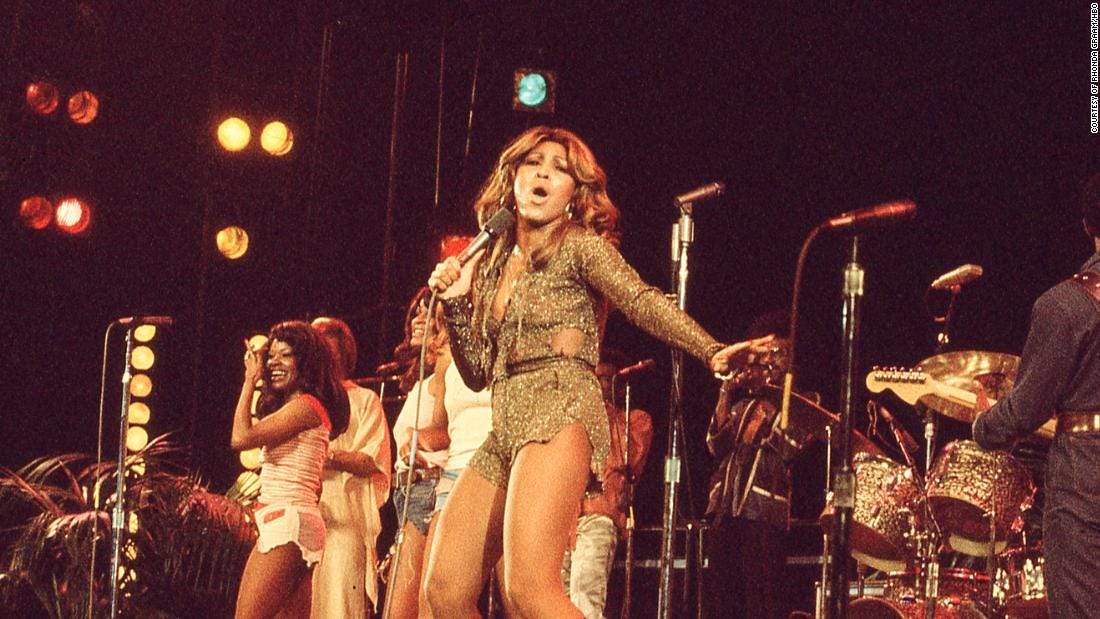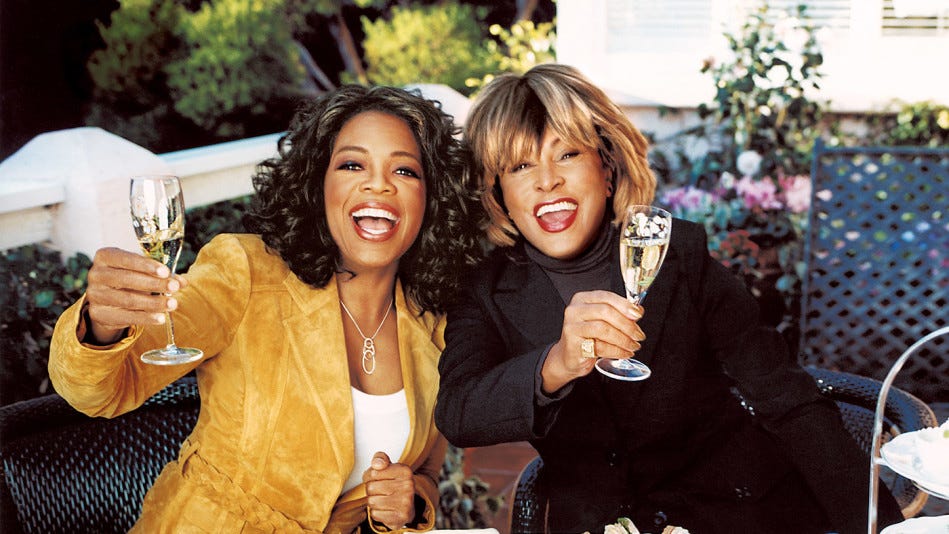Every attempt at a Tina biography has been better than the last.
I remember growing up with the hardcover of version of 1986’s I, Tina in my grandma’s book collection. A book that even then, when it was published, reduced a life worthy of at least five books to only 262 pages. It’s still, in 2023, sitting in the same place as its always been. On a shelf, within arms reach from the couch, in a pile of books that were all ‘just read’ 37 years ago.
(I also remember thinking that What’s Love Got To Do With It? and Waiting to Exhale were prequel and sequel, but that’s just the power of Angela Bassett).
My Tina, however, is late 1990s Tina. The glamour, fashion, and youth of the #archives weren’t on our internet yet. All I knew was the version of Tina on my TV.
Yes, I remember the “Private Dancer” music video, but its important to remind you that moments of 80s culture already felt like ancient history by the time I came of age in the 90s.
So, for me, it’s Hanes commercial Tina. It’s ‘Wildest Dreams Tour’ Tina. It’s ‘Oprah & Tina’ Tina. It was Tina, not at 28, but at 58.
At this very moment, I can't think of any 60-year-old artists who are being introduced to 15-year-old music fans. Not by the way of 'classics,' but as something new and noteworthy. New songs, new perspectives, new imagery, and even a new world tour.
She might’ve been the only artist to date gifted real redemption at that age, most likely (exclusively) due to the fact that the platform to celebrate this reinvention was given to her by another black woman.
I don’t know who else would’ve made space for a black woman Tina’s age (or a black woman in general) without pretending the opportunity came with risk, detriment, commercial considerations, or required deep corporate decisions.
Hint: It fucking doesn’t.
One thing about Oprah is that she ran her show like her own personal blog. She didn’t really care if you loved Tina Turner or not. She loved Tina Turner. So, she was gonna run 8,000 episodes and 4,082,984 minutes1 of interviews with Tina every chance she got.
I’m just realizing that not even Madonna — a queen of reinvention in her own right — has been afforded that. A few days ago on TikTok, a clip of her "Don’t Tell Me" music video came across my feed with a caption that not only was the video 23 years old, but Madonna was 46 years old during its release. That music video was a seminal piece of creative for 16 year old me, imprinting on me and turning me into a high-desert girl. Like Tina, Madonna moved out from America, where both the obsession with youth and the consolidation of media means there are less people available, incentivized, and empowered to champion artists that don’t boost their bottom line. Justice for Madonna. Period.
Tina was the embodiment of black female rebellion. Not rebellion defined by the expression of force, strength, and edge required for our survival, but rebellion in the direct steering of our futures, the love, loyalty, companionship in our requirements, and in our freedom to simply exit. To quit, disappear, move on, and unsubscribe from the places, eras, conversations, and rooms that hold our discontent, and from those who’ve appointed themselves as arbiters of how we get to express it and how long we’re required to remain in it.
Tina’s talent should’ve never been credited to survival and resilience. It was in her long before she met Ike. Long before the chaos of her childhood. Long before the universe chose her to be born in The South. I’ve always hated that the reporting on her talent has always credited violence as the instrument, and simply not just Tina. Even though at every stage and its exit — from cotton picker to abandoned child to teen mom to domestic servant to choir girl to rock star to legend — it was Tina’s foot that took the step.
She was a pioneer in the habit of reinvention, to a level that I don’t think most people can even wrap their heads around. The phrase ‘hard work’ doesn’t even begin to describe the scale of the hurdles that this little black girl from Brownsville, TN, had to overcome to be able to die an old lady in her castle in Switzerland. Many non-Black people in this country like to believe their spot is not only deserved, but exclusively due to their hard work (…or the hard work they inherited from a relative). But no Mayflower story, no covered wagon story, no Ellis Island story will ever receive louder applause from me than that of the enslaved and their descendants. Nowhere else has America's capitalism and racism so pointedly, specifically, and consistently worked against their survival, let alone their success.
Over the last few years, I've thought about Tina in a personal way. After the news of her firstborn son Craig's suicide in 2018, and again after her son Ronnie's death flashed across TMZ last December. I think about my own grandmother, though still very much alive, but living through a different version of life after the loss of her son. She managed to live a hopeful, vibrant, and busy adult life despite the loss of her own parents and her first husband, who all barely made it to 60. Her second husband of twenty-five years made it to 85 before passing away, leaving her a widow again. It wasn't until my uncle, her only son, suddenly passed away a few years ago that I saw the dim. Then a few years later, her youngest brother, an oops-baby born twenty years her junior passed away suddenly. Loss and grief as a parent or guardian take a specific toll.
I have to believe that in Tina's decision to move herself to safer spaces, she had come to terms with the risk of not being nearby during those goodbyes. How that took its toll, we'll never know.
In 1997, Tina famously told Larry King that she “left America because my success was in another country, and my boyfriend was in another country.” While her decision to leave America for good was rooted in acceptance, it was also a decision to no longer negotiate with the racist politics of America’s music industry and the limits it had continually imposed on her talent, marketability, and exposure since her days with Ike.
The “vestiges of Jim Crow” that were “still very much alive in the music industry,” said Tanisha Ford, a history professor at CUNY’s Graduate Center. “While rock and roll is rooted in the Black experience and the Black musical tradition, the mainstream industry has racialized it as ‘white’ music,” Ford said. “So Tina Turner had much resistance when she wanted to position herself as a rock ‘n’ roll artist.”
Just like everything else she’s done, Tina’s decision to leave America was visionary.
It first floated in my head during the squeeze of the 2016 election cycle, and become a daily thought during that presidency and its ongoing fallout. My decision to leave, if I ever do, wouldn’t be rooted in one political figure, though. It’ll be based on bandwidth. How much longer can I share spaces with people who thrive on the gore of our deaths? Who consume the media that celebrates our harm? I think about the never-ending threats to success, stability, and safety and the persistent theft of culture. Would experiencing a life with just 10% relief make the move worth it?
I’ve threatened it, and daydreamt it.
But Tina actually did it.
Listen:
“I’ve Been Loving You Too Long” (Spotify … my favorite song)
Watch:
TINA (HBO Max)
What’s Love Got To Do With It (Amazon Prime)
Spector (Showtime)
Read:
How Racism Pushed Tina Turner And Other Black Women Artists Out Of America (PBS)
That’ll be me and Shawn Mendes once CULTUREWORK TV happens.













Love Tina. Love you and reading your commentary on THE queen.